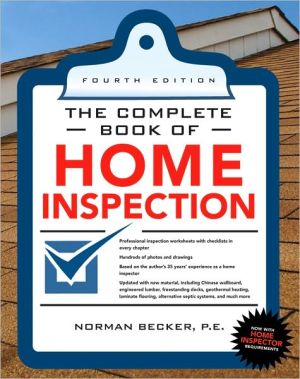Buying A House Or Apartment
Before investing in owning a home or apartment, readers should know what their real estate agent or broker is doing. The possibility for mistakes and dishonesty will always be there, and consumers need to be fully armed to make sure that their dream of owning a house or apartment doesn't become a financial or domestic nightmare. Readers will be much more confident about the sale knowing for themselves how to get the best price for property and mortgage rates, the pros and cons of hiring a...
Search in google:
Before investing in owning a home or apartment, readers should know what their real estate agent or broker is doing. The possibility for mistakes and dishonesty will always be there, and consumers need to be fully armed to make sure that their dream of owning a house or apartment doesn't become a financial or domestic nightmare. Readers will be much more confident about the sale knowing for themselves how to get the best price for property and mortgage rates, the pros and cons of hiring a broker, how to determine if property values will rise or fall - and what can be done about it.
What the "Experts" May Not Tell You About ... Buying a House or Apartment\ \ By Nancy Ramsey \ Warner Books\ Copyright © 2004 Dan Ramsey\ All right reserved.\ ISBN: 0-446-69092-9 \ \ \ Chapter One\ It All Boils Down to Property Rights \ Nobody really owns property. They actually own the right to use property. Some property rights include living on it, using the water on it, owning any minerals or oil under it, and even the right to sell some of these rights to others. And it's these property rights-not the property-that get bought and sold in the marketplace.\ Unfortunately, these rights can get confusing as owners sell off some and not others, forget to register (record) a sale, get a loan against the property, or give rights away to heirs. That's where things can get muddy. You come along ready to buy, but you may not be getting the rights you think you bought. That's where understanding property rights is really important to buyers. Most real estate agents know this, too, but some forget-or they assume that you know. A few don't care. So the first thing you need to know before buying real estate is how property rights work and how they are transferred between buyers and sellers.\ What Is Property?\ Just about anybody can own property, including individuals, groups (couples or corporations), and even governments. Fortunately, property rights are about the same for everyone. These rights are defined by state laws, but most states have similar laws about real estate, so most of the terms used here and by real estate professionals are the same.\ Real property, as you now know, isn't really dirt and a residence. It's the right to use a specifically defined piece of real estate.\ Lingo\ Real property is the right to use real estate. Real estate is the land and everything attached to it. Personal property is everything not attached to the land. The right of real property extends from the center of the earth to the end of the earth's atmosphere, unless otherwise ruled.\ What about the house on the property? Is it real property or personal property? The rule is: If it's attached to the land (typically with a foundation in the ground), it's part of the land and thus part of the real estate and real property.\ Insider's Tip\ As you start looking at houses, remember that if something isn't permanently attached to the house (refrigerator, wall hangings), it is considered personal property and is not included in the sale unless specifically mentioned.\ There are numerous ways that real property can be used. You can buy real estate to build a retail store, a wholesale warehouse, a factory, a rental apartment complex, or even a vacation home. In this book, we're covering residential real estate, the place where you will live most of the time. That can be a single-family residence (SFR) such as a house, a condominium (condo) apartment, a cooperative (co-op) apartment, or a Planned Unit Development (PUD).\ What's the difference? How you own it! With a house, you own all rights to the land, residence, and other components yourself.\ With a condo, you own the unit in which you live and share ownership of any common areas (entryway, yard, tennis courts, and the like). With a co-op, you own stock in a corporation that owns everything. When it comes to property rights, a PUD is like a house except that there's little or no space between units, and any common area is jointly owned; town houses are usually PUDs. More people buy houses than condos, co-ops, and town houses, but we'll cover buying all of them in this book.\ Title and Other Rights\ How does someone know who owns what real property rights? The owner is said to hold title to the property. This is very important to you, the buyer, so let's take a quick look at what it means.\ Title is evidence of real property rights. Somewhere in a nearby government building, on paper or on a microfiche, is a signed and recorded document declaring who owns each piece of real property in its jurisdiction. They keep track of title-and especially who owes taxes!\ Let me clarify that title and possession are different things. If they weren't, no one could rent property from the owner. The landlord holds title to a rental apartment, but the renters purchase the right of temporary possession. As you start looking at property for sale, you may consider houses that currently have renters in them, so understanding their rights is important to buying.\ There are a couple of ways of looking at title. If you get a mortgage, you can say that the lender actually owns the property and lets the buyer live in it; or you can think of it as the buyer owning the property subject to the rights of the lender. Some states see things the first way; some states see them the second. As a result, state laws are built from one of these two viewpoints. If the lender is considered the owner, it's a title-theory state; if the buyer technically owns the property, it's a lien-theory state. It's an issue of law that leads to slight differences in how buyers take title in various states, though most states follow the lien theory. If you're selling a house in a lien-theory state and buying one in a title-theory state, you'll see some differences in the paperwork. Otherwise, the process is about the same.\ So let's continue with ways buyers can take title to real property. Most buyers take absolute title to the property-called fee absolute or fee simple. Fee means ownership. The owners can do anything they want with the property as long as it doesn't violate zoning or other laws. (They can't turn a house into a factory, for example.)\ Lingo\ Fee absolute or fee simple means that the owner of the real property has absolute ownership, can sell or otherwise dispose of the property during his or her lifetime, and can will the rights of ownership to another upon the owner's demise.\ An owner also can say that the property can only be used for a specific purpose, such as an owner who wills land to be a school. That's called fee defeasible, or voidable ownership. Most residential property doesn't have this type of title.\ You also can hold title to property for as long as you live, with it transferred to someone else on your demise. That's called a life estate. Some retirement communities sell residences with this type of title. Once the occupants die, the title reverts to the corporation, which can then resell it. This makes sense for those who don't need to purchase absolute rights, because a life estate typically is cheaper.\ As mentioned earlier, you can buy the right of possession without purchasing the right of ownership. If that right is for a specified period of time (one, five, twenty years), what you're getting is a lease. It gives you most of the rights of ownership, but only for the stated time. For example, if you're moving to another city for your job and know you will only be there for three years, you can get a three-year lease on a residence and enjoy whatever rights the owner sells you, including decorating and even remodeling to suit your tastes. You might even be required to pay property taxes and other assessments.\ Pitfall\ Make sure you know exactly what type of title you're getting when you buy real property. If something happens to you or you try to sell the property someday, you may find out that you have nothing to give. This is especially true of apartments (condos, co-ops). If there is any doubt in your mind, ask a real estate attorney or title insurance officer to explain what rights you're buying.\ Here's one more thing to think about as you consider property rights. An easement is the right that someone else has to use your property for a specific purpose. Why would you ever consider such a thing? Because you want electrical, sewer, and water service! In order for these services to come onto your property, the utility companies must first ask your permission.\ If your title includes specific easements, however, they already have that right and don't have to ask. In fact, the easement was probably added to the title before a residence was built, so you may not have a choice in the matter. When you take title to the property, you accept any prior easements (though they can be changed with the help of an attorney). When you buy property, the title report will include specific information about easements to the property.\ Out in front of your residence, the city or county probably has an easement over your property because, in many places, you actually own the property up to about the center of the road. Because title includes a road easement, though, you can't throw up a barricade some fine morning and start charging people to drive over your property. The owner has already agreed to let people pass over it. Conversely, other people are letting you drive over their property. That's an easement.\ In addition, someone owns the rights to any and all minerals in your new property. It may be you or it may be someone else. If you find gold on your land, you may not be able to keep it. Chances are, however, that the gold, silver, oil, and just about everything else of great value was removed before the house was ever built; this is a nonissue in most locations. If you are concerned about mineral rights on the property you're buying, speak with an attorney or a title company officer to get an understanding of who owns what rights.\ There's one other set of rights that impact residential property: riparian. These are rights you may have-or not have-regarding bodies of water on or adjacent to your property. Is it your water? Can you dump in it? Whom do you share these rights with? These are all property right and title questions that you may need answers to. Again, a title officer or attorney can explain them to you as they pertain to any property you buy.\ Transferring Title\ So now you know what title is all about. But how can you make sure that you are getting good and clear title to property you buy?\ First and foremost, make sure that the person selling you the property rights has the right to do so! Fortunately, there are folks who make a living at researching and verifying titles on property: title companies. They use public records as well as their own extensive files on every property in your area to know who owns what rights. Most also will insure title to property, guaranteeing that they will pay for the defense of a property's title in court or even pay a judgment ordered by the court if the title isn't what they say it is. That's title insurance. You'll learn more about title insurance companies in the coming chapters.\ As a buyer, there are various ways that you can take title, or own rights to a property. That's important because it indicates your ownership interest (by yourself, or with others) as well as what will happen to the property if an owner dies, called right of survivorship. If, for example, there is a divorce, how the owners hold title will be important. As a buyer, you want to know what title is being offered as well as how you want to hold it. When it's transferred, the way that title is held usually can be changed, so you will want to know your options.\ Lingo\ Tenancy is the right of possession of real estate, including the right of ownership and occupancy. There are various forms of tenancy as defined by state laws.\ Let's take a quick look at how title can be held. It's a simplified description always subject to state laws, so you may hear slightly different terms. The intent, however, is about the same wherever you buy or sell title.\ Tenancy by the entirety gives husband and wife equal right of possession and the right of survivorship (if one dies, the other gets the property). This is sometimes called community property.\ Joint tenancy offers two or more people undivided interest in the property with the right of survivorship; it's similar to tenancy by the entirety.\ Tenancy in common gives two or more people undivided interest in the property but no right of survivorship (if one dies, the property must be sold).\ There are other forms and other names for these forms, but their intent is to define who gets what rights, including the right to the property if one of the owners dies. When property title transfers to you, make sure you know what you're getting.\ During the buying process, someone (agent, seller, escrow service, you) will request an abstract of title from a title company. It's a summary of the historical record of title for that specific piece of property, often dating back to when the parcel was part of a larger parcel that was subdivided. If you're using an agent, she or he may get this and review it for you, but, frankly, most don't.\ Insider's Tip\ Every piece of real estate in your area is defined, and title changes are recorded, at a city or county courthouse. It's public record so you can, at any time, go down and find out about property you're considering buying. It helps if you have the legal description, but even an address can get you basic information. Visit the local property tax office and the local planning office, too.\ Once the abstract of title has been reviewed and okayed, the title company issues a binder or insurance policy on the title. If you're dealing with a lender, you'll need that binder to get the money to buy the house.\ Escrow Basics\ As you can see, there's a ton of paperwork involved in buying a house. There are agreements, title papers, loan papers, and lots of documents to help protect the sellers and agents. Everything must be pulled together for the closing transaction. And someone you all trust has to keep track of the title and money that's changing hands. Who does this?\ An escrow agent is a trusted third party that works as a go-between for the seller, buyer, agent, lender, title company, and anyone else involved in a real estate transaction. The agent follows the instructions from the signed and countersigned purchase agreement-who gets what, when, and how-then takes care of all the paperwork, math, and transfers to make it happen.\ An escrowagent can be independent or part of the lender's or title company's staff. When buying property, it's typically smarter to use an independent escrow company, though a title company is a qualified third party for most transactions. Lenders should only be used as escrow agents if you are refinancing your mortgage.\ Summary\ You've learned more about real estate transactions in this chapter than some agents know. You've learned about property rights, what title is, how title can be taken, and how real estate transactions are closed. Along the way, I've given you some valuable tips to save time, trouble, and money. Whether you plan to use a real estate agent, have decided to buy property without an agent, or really don't know for sure quite yet, this introductory chapter and this part serve as a solid foundation for buying a house or apartment.\ (Continues...)\ \ \ \ \ Excerpted from What the "Experts" May Not Tell You About ... Buying a House or Apartment by Nancy Ramsey Copyright © 2004 by Dan Ramsey. Excerpted by permission.\ All rights reserved. No part of this excerpt may be reproduced or reprinted without permission in writing from the publisher.\ Excerpts are provided by Dial-A-Book Inc. solely for the personal use of visitors to this web site. \ \
IntroductionxiiiWhy Experts Won't Tell YouxiiiWhy I Will Tell YouxvHow to Use This BookxviPart 1What You Need to Know Before Buying Real Estate1Chapter 1It All Boils Down to Property Rights3What Is Property?3Title and Other Rights5Transferring Title8Escrow Basics10Summary11Chapter 2It's a Buyer's Market12The Marketplace12The Buyer15The Seller17The Players20Summary22Chapter 3Lenders Hold the Keys23The Money Market23How Lenders Lend25Mortgages27Fannie and Freddie29Summary31Chapter 4Getting the Home You Really Want32Determining Your Needs and Wants32Studying the Marketplace33Looking at Neighborhoods36Learning What You Don't Want37Making Decisions You Can Live With38Summary40Part 2Getting the Most from a Real Estate Agent41Chapter 5How Agents Are Supposed to Work for You43Understanding Agency43Brokers and Agents45Comparative Market Analysis48Seller's Listing49Marketing the Listing51Helping with Financing52Summary52Chapter 6Selecting a Gem from Among the Duds54Gathering Duds54Culling56Selecting the Best58Hiring the Best61Summary62Chapter 7Helping Your Agent Work Harder63Knowing Your Agent63Letting Your Agent Know You64Working with Your Agent65When and How to Ask67When and How to Tell68Relieving Buyer's Anxiety69Summary70Chapter 8Getting the Money First71Getting Smarter About Real Estate Finance71Your Financial Options73Prequalifying74Checking Your Credit77Summary80Chapter 9Interviewing Property81Getting the Facts81Sizing Up Drive-Bys83Walking Through84Reinspecting Choices87Summary89Chapter 10Making the Offer90Offer to Purchase90Including Contingencies92Making the Offer to Buy93Handling Counteroffers96Accepting Your Offer97Summary98Chapter 11Getting to Closing99Getting into Escrow99How Long Until Closing?102Keeping Everything Moving103Preclosing105Closing106Moving Out, In, and On107Summary108Part 3Buying a Home Without an Agent109Chapter 12Building Your Support Team111Hiring the Team111Lender112Attorney114Appraiser115Inspectors116Title117Escrow117Summary118Chapter 13Finding Property for Sale119What Are You Looking For?119Where Should You Look?120Finding Flowers Among the Weeds122Buying a Foreclosure124What Not to Buy125Avoiding Common Problems126Working Around Renters128Summary128Chapter 14Buying from Builders130Advantages and Disadvantages130About Building Contractors132Buying from Spec Builders133Working with Custom Builders134Negotiating with a Builder136Closing on a New Home137Summary138Chapter 15Doing Your Own Homework139Checking Public Records139Researching Title141Inspecting a Property143Getting an Appraisal145Getting a Home Warranty147Summary148Chapter 16Pulling the Money Together149Funding the Purchase149Preparing Other Assets153Creating Financing154Estimating Closing Costs156Estimating Time157Summary158Chapter 17Making an Offer and Making It Stick159Setting the Price and Terms159Writing the Offer161Presenting the Offer163Handling Counteroffers165Escrowing the Sale166Summary168Chapter 18Closing on Your Castle169Planning for a Smooth Closing169Early Occupancy and Other Challenges170Preclosing Review172Signing Your Life Away175Recording and Disbursement177Moving In177Moving On178Summary178Appendices179Appendix AReal Estate Glossary179Appendix BReal Estate Resources184Index199About the Author213








